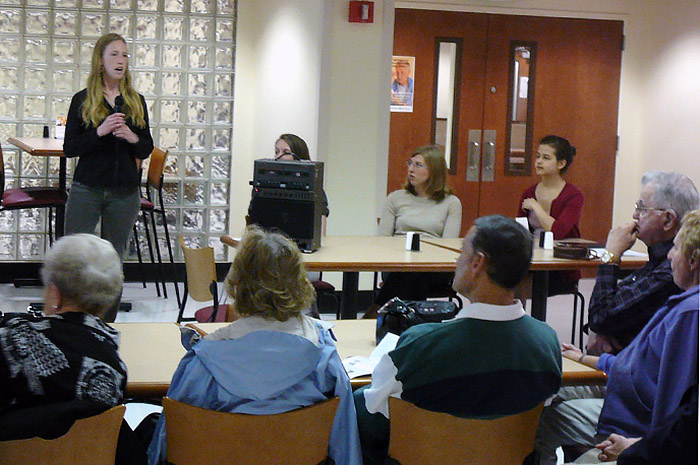Idle and Dangerous

Svenja Schneider '13 delivers part of a group presentation to regional physicians while co-researchers and fellow class of 2013 members (seated, from left) Christine Talbot, Tracy Campbell and Laura Schorfheide look on.
Student study helps local health professionals
by MaryAlice Bitts-Jackson
Idling diesel motors spew pollutants into the air that can degrade the health of long-haul truckers and those living and working along truck routes. But although a state act was passed in 2008 to outlaw unnecessary diesel-truck idling, the problem persists. The question is why.
Class of 2013 members Tracy Campbell, Svenja Schneider, Laura Schorfheide and Christine Talbot have a few insights, thanks to research they conducted while in Professor of Biology John Henson's health-studies senior seminar. And they've presented their findings to two professional groups.
Unexpected findings
The students built on previous Dickinson students' work indicating that more than one-third of truckers at a Route 81 rest stop did not comply with the Diesel-Powered Motor Vehicle Idling Act, known as Act 124.Campbell, Schneider, Schorfheide and Talbot interviewed approximately 30 truckers at two Route 81 stops to learn why.
Many respondents reported incomplete knowledge about the laws and the health risks, prompting the students to conclude that better continuing-education programs are needed. Complicating the issue, the truckers who fully understand the law reported that it is not well enforced and stressed that idling is the only way they can control temperature in their cabs while stuck in traffic, loading and unloading or sleeping in their vehicle.
“Some of the truckers felt it was unfair that in extremely hot and cold temperatures they were not allowed to idle when they had no other means to control temperature in their cabs, and these feelings led to lower levels of compliance,” explains Schneider, who plans to attend medical school and one day work with doctors in West Africa. “A connection needs to exist between the policy makers and those directly affected by the laws.”
From classroom to world
As part of their health-studies senior seminar, the students were required to present what they'd learned to a local partner organization. They delivered their report to the Pennsylvania Clean Air Board in December, and when a board member referenced the study during a conference address, Chambersburg reporter Jim Hook noted the findings in a Feb. 18 article on the issue.
The students also were invited to present during the April 17 meeting of the Harrisburg chapter of Physicians for Social Responsibility (PSR). “They were very interested in our presentation, and afterwards, we spent an additional hour talking to some of the members individually about the history of and possible solutions to this problem,” Schneider says.
For Campbell, who plans to attend medical school after completing a two-year program researching T-cell targeting at the National Cancer Institute in Bethesda, Md., the experience represented a bridge between undergraduate and professional work. “It was a useful transition from class presentations, which are generally done for a grade, to a real-world presentation with very different goals,” she explains. “It helped me realize that the work I had done was meaningful and could actually have an impact on the community.”
Read more about health studies at Dickinson:
Published May 1, 2012